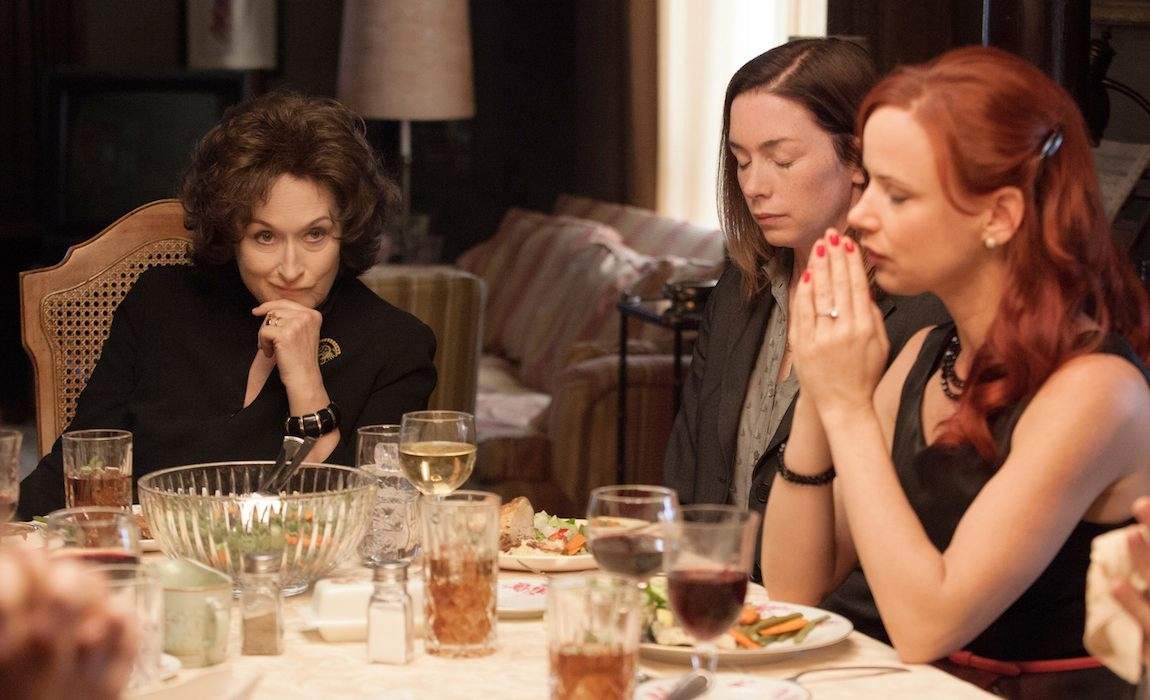August: Osage County
So many famous people band together for a good approximation of a great play.
Overview
In the wacky family comedies you usually see at this time of year, everyone will come to accept the quirks and legacies of their kinfolk. They'll acknowledge that even a wacky family is better than no family, probably while laughing around a Christmas ham with all the trimmings. August: Osage County is not that movie.
It started life as a play — in fact, probably the best play I have ever seen. Sydney was lucky enough to receive a visit from its original production company Steppenwolf in 2010, giving Australian audiences a chance to join the cacophony of praise already coming from the Tony Awards committee, Pulitzers, American critics and Broadway-goers.
But what was amazing about the show seemed quite theatre-specific. At nearly four hours long and set across a three-storey, bisected house, Osage County feels momentous. And more than that, it relies entirely on the crackling chemistry of its taut ensemble, a feat that seems magical on stage but prosaic on screen, where you know it's the product of take after take, plus editing.
Sure enough, the new film — adapted by its own playwright, Tracy Letts, and starring a cast so heavyweight as to tip the scale into ridonkulous — is good, but it's not quite great. The tone is spot on: it's dark comedy infused with the Southern Gothic. You will laugh, but you'll probably feel evil about it.
The family in question is the Westons, who are all drawn back into their childhood home miles from any significant town in Oklahoma. It's not the festive season; rather, the family patriarch, Beverly (Sam Shepard), has disappeared without warning or explanation, leaving his abrasive, abusive, cancer-inflicted and pill-addicted wife, Violet (Meryl Streep), alone with only the new carer, Johnna (Misty Upham).
Violet's children understandably have mixed feelings towards her, but they're also dragging their new problems into the house. Barbara (Julia Roberts) is there with her recently estranged husband, Bill (Ewan McGregor), and teenage daughter Jean (Abigail Breslin); lifelong adolescent Karen (Juliette Lewis) has pinned all her hopes on the shoulders of shifty new fiance Steve (Dermot Mulroney); and Ivy (Julianne Nicholson) feels emboldened by a clandestine romance with her timid cousin, 'Little Charles' (Benedict Cumberbatch).
This all culminates in a couple of exquisite dinner table confrontations, during which a lucid and destructive Violet exercises her finest skill and favourite hobby, 'truth telling'. Streep is, of course, excellent to watch in these moments, although every one of the actors needs to be — and is — at their best in the rapid-fire, emotionally fraught verbal rallies.
Even if their purpose is to poison, Letts' script is full of beautiful words, which might actually be a let down for the movie. It's lofty, alienating and artificial in a way that doesn't totally work on screen, and a fair few critics have taken the hatchet to it in return.
Elsewhere, though, Letts and director John Wells have done well making a very theatrical work cinematic (and have, mercifully, cut down the length). In the absence of the 'character' played by the imposing set, plentiful landscape shots of the open yet unfriendly plains of Osage County make an impact. One of the best scenes has Violet, hit by withdrawals, run blindly, desperately into this landscape, and it's one of the few moments where you really feel for her, and for her inability to escape a prison that she has helped build.
If the film doesn't quite stand on its own, it's at least a good approximation of a great play. And some kind of record for sheer quantity of acting.





